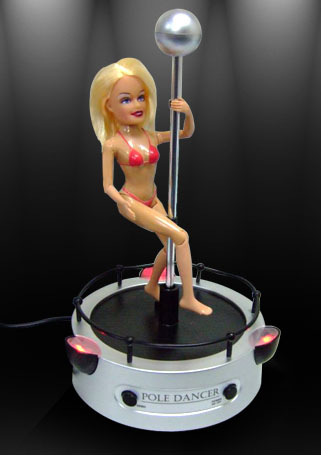Empowerment through pole dancing?

Source: https://lh4.googleusercontent.com/-xpI_I3C4IIM/TYDlR8iE0xI/AAAAAAAAB6E/kBaDNXkMAiU/s1600/usb_pole_dancer.jpg
Despite such clubs being banned elsewhere, the student pole dancing club was recently soliciting new members at my university’s freshers’ fair. The toxic effects on gender relations of pole dancing’s explicit objectification of women within the sex-industry have been extensively discussed elsewhere – see the Object campaign for example. Pole dancing has been adopted into the body-sculpting repertories of fitness clubs; it is, however, impossible to decouple it from its problematic sex-industry heritage.
Southampton’s student intake, as a Russell Group university, is predominately middle class. Without evidence, I’m unable to say however, whether the pole dancing society exists as ironic fitness pursuit offering a frisson of transgression for affluent students or an opportunity for those students desperate to meet the rising cost of university fees to acquire a valuable skill for free. I can say the society’s presence is evidence of the normalisation of pole dancing – a process that is reinforced by the idea sex industry pole dancers are empowered women parting silly lascivious men from their cash. The purpose of this post is to use sociological research to help expose this as a myth and contextualise pole dancing’s power relations in terms of social class.
The reality, as a paper in the British Journal of Sociology (Sanders & Hardy (2012)) shows, is somewhat different. The paper’s authors describe the recent history of the strip industry. Initially, a relatively small number of clubs in the UK such as Stringfellows in London that peddled expensive fantasies of exclusivity and luxury. These were strip clubs “coded with messages to suggest class, sophistication and style” where the relatively high cost of alcohol helped “deter the working-class drinker” (p524). Back then Sanders & Hardy argue, for at least some women, stripping was indeed a lucrative job. Since the turn of the century, favourable market conditions and licencing laws transformed nocturnal town centres into leisure destinations. A nationwide expansion of strip clubs – there are now over 250 in the UK including chains – met the demand for young men keen to spend their disposable income on aspirational hedonism such as champagne and private dancers.
But this proliferation of clubs combined with a drop in living standards for the majority of Britons meant dwindling door receipts even for market leaders. In response, clubs abandoned many of the pretences of exclusivity, downgraded the cost of a ‘luxury night out’ and encouraged custom from a broader socio-economic demographic. This means club owners today continue to reap financial rewards by exploiting the powerless; the dancers who have seen a dramatic erosion of their occupational status, conditions and pay (Sanders & Hardy, 2012). Having been denied any bargaining power by market conditions the dancers have, more than ever before, become disposable commodities – particularly economic migrants and students who are unable to rely on their parents for money. In other words people who lack the forms of capital associated with higher social class are exposed to the all the risks.
This is class in microcosm; in today’s neoliberal volatile job markets the less people have to fall back on in terms of education and training, savings and social contacts: the fewer forms of capital they have available the more exposed they are to risk. As Curran (2013) said in his recent critique of Beck, risk “follows the contours of class”: this is never more apparent than in the sex industry. Far from being empowered neo-feminists pole dancers, the evidence tells us, have taken their place in the Britain’s “precariat” class (Savage et al., 2013) and the university pole dancing society highlights an uncomfortable contrast between those who possibly pole dance for fun and those who definintely pole dance to make ends meet.






1475-682X/asset/akdkey.jpg?v=1&s=eef6c6a27a6d15977bc8f9cc0c7bc7fbe54a32de)
This is bizarre! The leaps in logic are astounding! If you are trying to be taken seriously as an academic, while belittling a hobby which a lot of women (and men) enjoy, do a better job of it, and close the gaps in your premise.
Moreover, stop recycling Catherine McKinnon’s tired ideas from the 1980s. The scholarly field of Women’s and Gender Studies has made leaps and bounds from that time period, as well as, the understanding of human sexuality. By telling women how to behave and what things they can and cannot enjoy, you sound a lot more like the patriarchy than any sort of ally to feminists.
As a recreational pole dancer in America, and an attorney who works daily on issues of gendered and sexual violence, I can use my personal experiences (and those of my students) to attest to the empowering nature of pole fitness/pole art. A pole studio (which is a very different setting than a strip club, though we shouldn’t belittle those women’s experiences either) is a wonderful, safe space. Women in my classes develop physical strength and flexibility, body confidence, general confidence, a sense of community, and an opportunity to explore their own artistic goals. Instead of focusing solely on strip clubs, you may wish to actually speak with pole dancers from the fitness community. As a novel idea, ask us why we love this sport/art form. Then, watch some videos online of the many professional pole artists who work as instructors and circus performers.
I’m sorry you’re offended by this article. I do, however, suggest you may have misinterpreted its message. While pole dancing may be empowering to hobbyists such as you and your colleagues, research here in the UK (which I’ve cited above) shows women who pole dance for a living are being disempowered and exploited.
What you wrote, if you didn’t intend to belittle non-sex-industry pole dancers, is begging to be misinterpreted. I suggest you heavily revise your first two paragraphs because they read as if they are judging women who engage in pole for either fitness or art purposes as being part of the “explicit objectification of women”. Then, “without evidence”, you imply that the university fitness clubs are training grounds for strippers or a venue for rich girls to mock strippers. That is a pretty huge leap, and, again, I would urge you to actually speak with the women (and men) in the club and ask them about their experiences, rather than attempting to slut-shame these people. To draw rather outrageous conclusions without speaking to the people engaged in the sport/art form is both lazy and irresponsible scholarship. You can do better.
If your intent was to note the disparity between socio-economic classes and their relation to the pole, there are better ways to frame the issue. (Also, please remember that many strippers do not engage in complicated pole dances.) In fact, you do a better job of framing the issue (with more concise language, I might add) in your brief response to my initial comment.
I would also note that the dynamics between the pole sport/art world and the strip club world differ from the way you implied in your second paragraph. Many artists have moved from the strip clubs to fitness studios and circus troupes, but few have gone the other way. The socio-economic ramifications of this dynamic might be an avenue worth exploring in your paper.
I’ve considered your arguments and I’ve edited the article in response; I’ve made the distinction between recreational and sex industry pole dancing clearer.
Pole dancing’s function in the sex industry is to objectify women; advertise their bodies for a private dance:
its recreational form is not isolated from these cultural connotations. If this was untrue children poIe dancing recreationally would be unproblematic.
My main argument however is research shows in the UK pole dancers in the sex industry are being exploited; therefore a pole dancing club at university is problematic.
This is just my opinion; it’s blog post not an academic research paper.
Hi Huw,
As you have directly (and incorrectly) referred to the Pole Fitness Society and in fact wrote this article in my year as President, I feel it is my duty to step in and say something.
You mention:
“Without evidence, I’m unable to say however, whether the pole dancing society exists as ironic fitness pursuit offering a frisson of transgression for affluent students or an opportunity for those students desperate to meet the rising cost of university fees to acquire a valuable skill for free.”
Firstly, I can assure you there is no irony, nor is there any link whatsoever between society members and their desire to meet the costs of university using sex work through joining this society. I was one of the first members back when this society was founded and joined because I was in awe of the amazing feats of strength I’d come across. It’s this message we portray; that Pole Fitness is about getting fit outside of the gym. Building strength through vertical bar gymnastics. Four years ago I couldn’t do a press up, now I’m stronger than most of the men I know.
Secondly, please don’t be so naive as to think we’re teaching girls how to do sexy dances in high heels and their underwear for free. For a start, lessons aren’t cheap! A lot of effort risk assessing, insuring and appropriate advertising goes into running this society and we have spent a long time building up our reputation. Our lessons require students to be barefoot and beginners often wear leggings and tshirts. Yes, as you get advanced, you work your way up to crop tops and shorts, because skin contact and the friction is required. You try holding onto a chrome pole with nothing but your elbow in long sleeves and tell me how that goes.
This society was set up so anyone could have the chance to realise the strengths they are capable of – referring to women AND men! In my 4 years at the Uni, I have seen as many men on the pole at the university as women and we have never discriminated in this society (in fact, actively encourage men to join).
I would not – nor do I know of any members who would – waste the skills we have spent so long training for, on sex work. Strip clubs and pole fitness are not interchangeable, so please do not suggest that because we are pole athletes, we must therefore want to gyrate around a pole naked and taking money off sleazy men. We spend 3/4 years working towards a degree, are you seriously going to insult us by saying that certificate at the end of it was a waste because we’re just going to have sex for money? Oh please. I’ve got a Masters degree and I’m sure as hell going to use it, but that would be nothing without the confidence I picked up from pole. So please do not offend me with your ignorance.
You’re more than entitled to your own opinion on this subject, but if you’re going to name drop a specific society, perhaps you should extend your research to them before making such lewd assumptions.
I think pole dancing is disempowering to women who don’t want to do it but do it anyway. Any activity can be disempowering if the individual does not like it. However, when it comes to pole fitness, which is a massively growing industry, I can’t see women turning up to class in order to feel disempowerd like the girls working at a strip club. Can you?